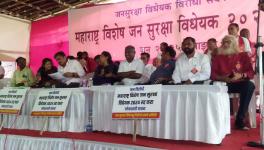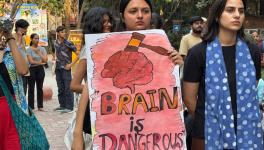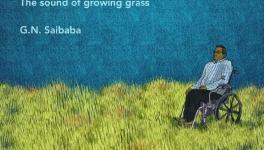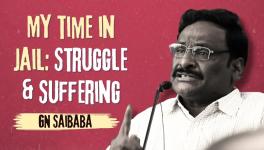‘Can’t Imprison Thoughts’: GN Saibaba’s Book of Poems and Letters From Prison Launched
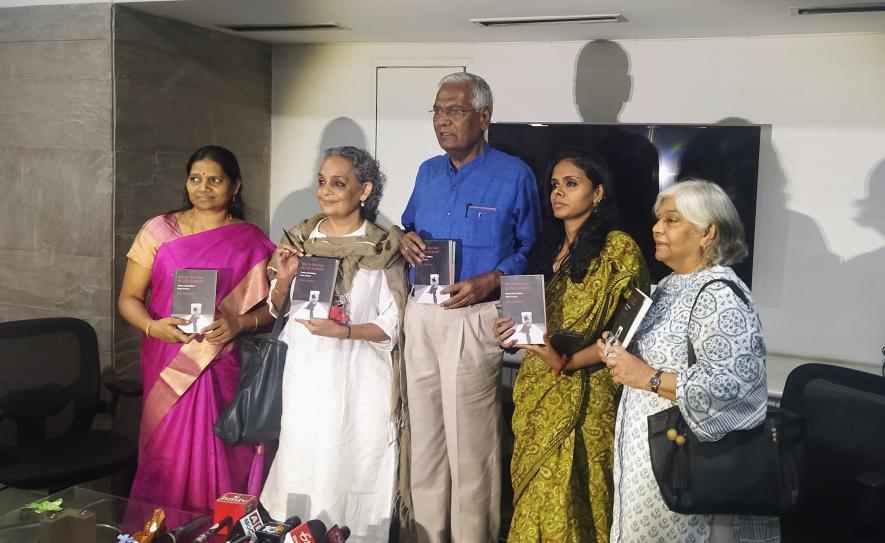
New Delhi: Jailed academician and human rights activist GN Saibaba’s book, Why Do You Fear My Way So Much?, comprising poems and letters written in prison to his wife Vasantha Kumari, friends and colleagues, was launched on Wednesday. The book is published by Speaking Tiger Books.
Saibaba, a wheelchair-bound person with 90% physical disabilities, was sentenced to life imprisonment in 2017 by a sessions court in Maharashtra on charges of having Maoist links and engaging in activities amounting to "waging war against the country". He was deemed guilty under the controversial Unlawful Activities (Prevention) Act, even as he continues to deny the charges against him.
Calling Saibaba an inspiration, D Raja, general secretary of the Communist Party of India, reiterated the demand to release the former professor from prison as he launched the book. “Saibaba should be immediately released from prison,” he said.
“Prisoners have rights and those must be respected. The government of the day thinks they can label some people as urban Naxals and Maoists and put them in prison. But they will never succeed, as a communist can be killed but can never be defeated, Mr. Modi,” said Raja, referring to Prime Minister Narendra Modi.
The CPI leader said he has spoken to Union Home Minister Amit Shah about Saibaba’s release but the minister apparently said that charges against the academic were “very serious” and he could not do anything. However, Shah apparently told Raja that he would try to do something about Saibaba’s healthcare.
Booker prize winning author Arundhati Roy, who was also present at the book launch, recounted her past comradeship with Saibaba when they campaigned against Operation Green Hunt in Bastar, Chhattisgarh. She said he posed a threat to the status quo as he “wrote on the line where the Left meets caste.”
Comparing India with a flying plane, she said: "The leaders of this country are flying the plane in reverse, everything is falling, and we are headed for a crash.”
"We are meeting to talk about a professor who is paralysed 90% and has been in jail for seven years. That is what we are doing,” she said, adding that it was enough to understand what kind of country we were living in and that it was “shameful”.
Saibaba’s wife, Vasantha, said he had come a long way through a difficult life. Her speech at the book launch and her letter to Saibaba as the introduction to the book describes how at the tender age of five, Saibaba lost his ability to walk owing to polio because the vaccine was not widely available then. He grew up in a remote village in Andhra Pradesh, studying under the dim light of kerosene lamps till he went to college. It is at this village that he met his life partner Vasantha, connected through their shared interest in literature. Through all his struggles, Saibaba found a life partner, had a child, and got a job at a reputed university (Delhi) alongside his fight for the rights of tribals and the poor. And now, he has served seven years (since 2014) in prison.
Speaking with Newsclick, Roy said Saibaba’s book “deepens that human being who is in prison and thus it also deepens our understanding of all that he stands for. This book is evidence that what you are putting in prison are all these ideas, what you find dangerous are these ideas, and not the person.”
Talking about Saibaba’s various health-related problems, his left hand becoming paralysed due to alleged mishandling during his arrest, his problems with movement due to disability, Vasantha said: “The State thinks it can jail his thoughts and kill him in the prison. That’s why no treatment is being given to him. But the book is evidence that (jailing his thoughts) is not possible.”
She further said Saibaba’s multiple medical bail and parole applications have been rejected. During the pandemic, he contracted COVID-19 twice while in prison. He is lodged in Nagpur Central Jail. She added that the solitary ‘anda cell’ (having egg-like shape) where he is lodged is partially covered by a roof with rest having iron bars, exposing the inmate to all weather harshness. “The whole case is a conspiracy,” she said, claiming there was no concrete evidence.
Last year in March, Delhi University's Ram Lal Anand College terminated Saibaba’s job as assistant professor, cutting off the last active income for his family, comprising his wife and daughter.
Teaching is a major passion for Saibaba and DU terminating him from his position was hard on him, Vasantha said, adding: “He cannot imagine a life without teaching.”
In her letter to Saibaba, as published in the book, Vasantha writes: “This prolonged separation is gradually wearing me down, mentally and physically.” But she also follows it up with deep worries about Saibaba -- “I know that this separation is miserable for you too… Even able-bodied people are not able to endure the harshness of prison life; it must be far worse for you. But still, like you said: ‘We should not drown ourselves in our miseries. The actual misery lies within the society… Our victory lies in nothing more than overcoming that misery.’”
The theme of overcoming challenges with a powerful sense of hope is repeated throughout Saibaba’s letters and poems. He invokes Sant Kabir as he speaks of a love that blurs the line between the personal and the political. Several of his poems appear to have been addressed to his wife. In one of his poems, he writes,
“I think of your evergreen smile
and love sitting in my solitary
prison cell far away from your
shining eyes of hope while my heart
whines and body pains.”
In several other poems, the academic talks about themes of love and freedom to his fellow “dreamers” and comrades. In others, the solitary life and darkness of the prison seep in, giving a glimpse into his inner life in jail.
“All his poems are about a certain optimism and never pessimism, despite what he has gone through, and we have to keep this radical optimism very much alive with us,” said poet and writer Meena Kandasamy.
“These are supposed to be political poems, but they are all love letters,” she said, and continued: “As much as we read them as letters of love, they are also letters of warning for each of us. It is important for all of us to understand that if we are trying to create a world against the politics of hate, we must actively fight for it.”
To elaborate her point, Kandasamy quoted a stanza from one of the poems entitled ‘Love Isn’t in Shrines’: “Listen to me, O grievers,
The world of love takes shape
In your acts of struggle for it.”
Get the latest reports & analysis with people's perspective on Protests, movements & deep analytical videos, discussions of the current affairs in your Telegram app. Subscribe to NewsClick's Telegram channel & get Real-Time updates on stories, as they get published on our website.












